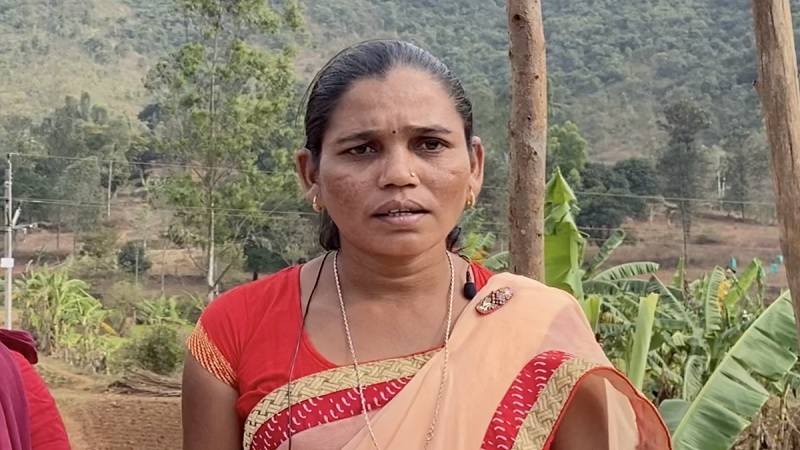
Image Courtesy:survivalinternational.org
On March 8, 2022, the first anniversary of Adivasi activist Hidme Markam’s arrest, fellow rights defenders and international organisations called upon Chhattisgarh Chief Minister Bhupesh Baghel to immediately arrange for her release. People voiced this demand at a press conference hosted by the Adivasi Lives Matter along with the Front Line Defenders, Survival International, People’s Union for Civil Liberties (PUCL) – Chhattisgarh, India Civil Watch International, and Hindus for Human Rights.
The 29-year-old environmental activist was arrested at an International Women’s Day event in March 2021 under the draconian Unlawful Activities (Prevention) Act (UAPA). For years, she led efforts to free incarcerated Adivasi youth held in pre-trial detention and to stop mining projects at the Nandraj Pahad hill, a sacred site for Koya Adivasis. According to a coalition of international and India-based organisations at the press conference, the UAPA law is used to arrest countless human rights activists.
Present at this conference was Adivasi human rights activist and Front Line Defenders Award 2018 Winner Soni Sori. She questioned the legitimacy of the charges levied against Markam and pointed out how the police repeatedly failed to show a court warrant. Even a year later, the police still have not produced the document to justify the sudden arrest.
“Hidme emerged as a leader and the government was scared. So they arrested her,” said Sori, emphasising that thousands of Adivasis have been arrested in a similar fashion. Sori too was arrested in 2011 on false charges and survived torture and sexual violence inside prison. In 2014, she was finally acquitted in six of the eight cases filed against her, and released.
Prabhat Kahabr’s Adivasi journalist and Indian Social Action Forum President Dayamani Barla, popularly known as the “Iron Lady” of Jharkhand also demanded justice for Markam and other activists saying, “Adivasis have had to keep raising the slogan that they will not allow a single inch of their ancestral land to be taken away. We will give up our lives, but we won’t give up our land.”
Similarly, Bastar’s independent writer, researcher, and human rights lawyer Bela Bhatia said that Markam’s arrest follows the same pattern used by authorities to arrest Adivasi activists in the district since 2005.
“Since 2015, we are seeing the use of the UAPA. If we include all seven districts, the use of the UAPA in Bastar must be the highest in India. Underlying this is the large-scale militarization we are seeing in Bastar since 2005,” she said, noting that estimates from a few years ago placed the number of armed troops on the ground at 1 lakh personnel.
Aside from local trailblazers, Front Line Defenders Asia Pacific Protection Coordinator Deanne Uyangoda also spoke at the event.
“We stand in solidarity with Hidme and all that this term embodies. The Government of India has managed quite successfully to target HRDs with impunity and with a certain callous disregard for the pushback locally, nationally, and internationally. What is particularly damning, is her engagement with members of government on the very issues she is facing. The charges brought against her are about prolonging detention,” said Uyangoda. The day after Markam was arrested, her organisation condemned the arrest.
Aside from condemning the government’s actions, Survival International’s Dr. Jo Woodman spoke about the global organisation’s recently released report titled Brutalized for resistance: The assault on Indigenous women in Modi’s India.
The group fighting for tribal peoples’ rights, observed that it is becoming alarmingly normal for dissenters resisting land-takeover to be killed by security forces. Woodman said that their deaths are sold to the media as the unavoidable outcome of encounters with insurgents.
“It is alarmingly normal for these security forces to storm into villages, to sexually abuse women, pillage supplies, kill and eat their domestic animals,” she said.
She condemned the central and state governments for enabling state and private mining corporations. Woodman closed by saying that such atrocities against Adivasis seek “to teach Adivasi communities that they must obey. But what it actually teaches them is that the State is pitted against them, and values the resources under their lands, but not their lives, their cultures, or the rich forests that they have nurtured and protected.”
Related:
UP’s tribal belts show unusual voter activity
Women’s dissent: India’s feminist legacy
Jharkhand: Police physically assault Adivasi farmer
SKM demands justice for West Bengal and Odisha Adivasis